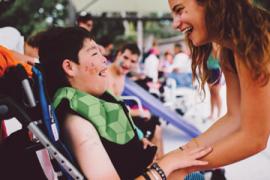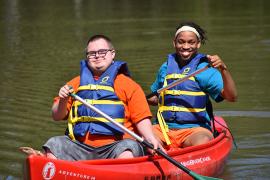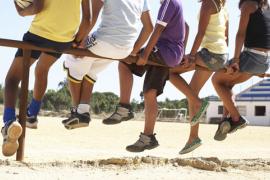In the summer of 2015, we partnered with a talented group of Chinese educators called Initiate Development for Education and Service (IDEAS) to operate a resident camp and a day camp in China. The resident camp had been operating for several years while the day camp would be the first of its kind in Beijing. The IDEAS team wanted to bring some expertise and personnel from the U.S. to help improve the training, programming, and developmental outcomes of their camps.
IDEAS is one of the founding members of the China Camp Education Association and sees camp as a powerful vehicle to teach young people 21st-century skills and dispositions, including leadership, communication, collaboration, critical thinking, and creativity. While the Chinese education system excels at teaching subjects like math, science, and language, it does little to actively cultivate these skills that researchers and employers have identified as critical for success in the modern economy. The IDEAS team wants to focus on fostering these skills and dispositions through “camp education.” The team members’ passion and excitement made them an exciting strategic partner.
We helped hire international staff, including experienced directors for both of the camps. We created a counselor orientation program and helped conduct the training. We also helped select the site for the day camp and develop the program and schedule for it.
The experience was both fascinating and an opportunity for us to practice our own critical thinking, problem-solving, and creativity.
There were challenges associated with our experience helping to build summer camp programs in China, but we want to stress that the rewards greatly outweighed them. We focus on the challenges here because they might help us understand the differences between Chinese and American camps so we can create even better partnerships in the future.
Anticipated Challenges
As with any truly new endeavor, we did not know what we did not know. Some of the challenges were easy to anticipate. We knew we would be dealing with language barriers, international travel issues, and time zone differences. As expected, meetings take more than twice as long because everything must be translated. We dealt with jet lag when we traveled and phone calls at odd hours when we did not.
Unforeseen Challenges
What about the challenges we did not see coming, many of which were overcome through hard work and intentional collaboration? Some were minor but noteworthy. Others were more fundamental and merit substantial thought on how to address them going forward.
Doubly Lost in Translation
While we knew we would deal with the language barrier between English and Mandarin, we soon realized we had a separate translation challenge: camp lingo. Terms and phrases that we take for granted have no context for noncamp people. If you have never worked at a camp, concepts like bunk assignments, counselor burnout, and cabin talks make little sense.
If you have worked at camp, you know many of the techniques that counselors and staff can use to impact children. If, however, you have not, they are truly foreign. A “talk circle” is not something that most people experience naturally. At camps in the U.S., we can train those completely unfamiliar with camp by using returning counselors and staff. We can call on our alumni and extended camp community. But in China, we did not have camp alumni nor a base of returners who could educate the new counselors. Our international counselors (from the U.S., England, Sweden, and South Africa) had previous camp experience, but none of them spoke Mandarin so they could not easily share their knowledge with our Chinese staff. Many of them came from cultures as different from Chinese culture as ours — some even more so. We had dedicated translators who could translate the words, but not always the concepts.
Luckily, we had a few bilingual individuals who also had some exposure to the summer camp experience. For example, two of our bilingual Chinese staff attended a two-week training session in the U.S. before our orientation in China. These individuals were critical to helping bridge the combined communication gap of language and lingo.
Next year, we will have a greatly expanded group of veteran Chinese counselors so this challenge should begin to diminish, but it was a true limitation in our first summer. Our plan for this summer is to rely on greater numbers of Chinese staff, and to hire as many Mandarin-speaking international staff as possible.
Cultural Differences
Cultures differ in ways that are not easy to anticipate.
Meals have odd differences. For example, the Chinese will typically drink warm or hot water, even in summer. While we initially thought this odd, we realized that Americans typically expect ice water in winter, equally odd for our Chinese friends. Our international staff would ask for ice and receive confused looks.
Similarly, Chinese prefer to sleep in warm rooms without air conditioning while their international counterparts are more enamored with cooled rooms at night. We found that our international counselors would turn on the AC in the bunks making their Chinese campers and counselors uncomfortable and worried about becoming sick.
While you might hope that this simple misunderstanding could be quickly resolved, a second challenge prevented that: It is generally considered impolite in China to be confrontational. The typical American camper is more comfortable expressing discomfort and concerns. Chinese campers and counselors are generally more reluctant to disagree publicly or complain. Doing so is seen as somewhat disrespectful or unappreciative. As a result, several cabins suffered in silence when a simple conversation could have resolved the issue.
The Challenge of Communal Living
Between 1978 and 1980, the Chinese government introduced the “one child policy” to help control population growth. While providing some exceptions, the policy generally limited families to one child. This policy was in place until 2015, and while the government has recently begun to loosen restrictions, it had some profound effects during the 35+ years it was in place.
From a camp director’s point of view, this policy means that most children are accustomed to being the focus of both parents and multiple grandparents. They live in their own rooms without other siblings in the house. Further, generally, Chinese children do not have many sleepovers with other children. They also spend less time than their Western counterparts doing sports or group activities.
All this adds up to children who are far less experienced with communal living. As camp professionals, we know that cabin dynamics create both opportunities and challenges. Campers need to learn to share their possessions and their space. They develop conflict-resolution skills and learn to listen to each other. They become familiar with compromise and not always doing the activities that they would choose. In fact, the cabin is one of the best tools to teach the 21st-century skills of communication, problem-solving, and collaboration.
Because cabin life was new and unfamiliar to Chinese campers and counselors, we had to put extra time and effort into helping the campers learn to grow as a cabin. Once again, the counselors who spoke the campers’ language were also unfamiliar with creating a cohesive cabin. The international counselors who understood this dynamic could not conduct a cabin meeting on their own. It is clear to us that this is an area of continued opportunity and growth over the next few years. Going forward, we plan to put more time into teaching cabin dynamics, but we also look forward to having new and returning Mandarin-speaking counselors who have cabin experience. They will not only be more effective in their second summers, but they will also be integral in educating new counselors.
Fun and Free Play
Many Chinese families, especially those capable of affording a camp experience, have high expectations of their children, with a special focus on their education. Schools often have longer days than the U.S. and assign considerable amounts
of homework.
This focus on academic performance makes sense when you look at the Chinese college admission system. In China, high school seniors hoping to attend college take an eight-hour standardized exam called the gaokao (“high test”) that is the sole consideration for college admission. A great score means attending a prestigious college. Until recently, the best jobs went to the graduates of the best colleges. So a good gaokao test result means better jobs later in life. Because organized sports and extracurricular activities are not considered in college applications, they are less valued by families.
We see a substantial amount of parental concern about college admissions and test scores in the U.S., but nothing compares to the singular importance of the gaokao in China.
As a result, parents choose activities for their children that they hope will enhance academic skills and create advantage — from academic enrichment programs to music classes. Parents are less likely to choose an activity simply because it is fun.
The original camps in the U.S. were started by educators who hoped to challenge children and help them grow. Over the years, however, we have become more associated with fun than growth. Parents do not always understand the benefits of the camp experience, but they and their children can understand fun activities. As a result, we often choose activities and special events for the simple purpose of delighting our campers.
In China, our partners and parents placed extra importance on activities that had easy-to-understand advantages. For example, teaching Chinese calligraphy or robotics provided clear outcomes — the culture and discipline of calligraphy and the planning, execution, and problem-solving of robotics. On the other hand, “ga-ga” did not initially make sense to them. In the U.S., most camps add ga-ga simply because campers love to play it and they have fun doing so. Before we added a ga-ga pit in China, we had to explain the many benefits of free play, including children making and enforcing their own rules, the opportunity to practice and strengthen creativity, conflict resolution, and sportsmanship.
The Chinese term for camp actually translates to “camp education.” While we initially found this a little strange, we have come to admire and appreciate it. By calling what we do “camp education,” we help inform our families about the benefits of camp as well as remind ourselves of our opportunities to impact children.
Since our time in China, we continue to look at every element of our camps with an eye toward the educational and developmental outcomes. Frankly, we believe that this exercise helped make us more intentional camp professionals.
Leadership Style and Culture
The other major challenge we faced was with our year-round staff, or, to be more specific, our two staffs. Ultimately, we had two very distinct groups that had very different skills, experience, and dispositions: the English-speaking international team and the Mandarin-speaking Chinese team.
One was familiar with the camp experience. The other understood Chinese culture, the Chinese market, customs, and families.
The two teams had extremely different dispositions and expectations of the workplace. In China, many employers place a high priority on employee loyalty (obedience) and have a highly hierarchical structure. Showing respect is critical. At times, employees are reluctant to ask questions because they do not want to seem incompetent or to suggest that the boss was unclear. They are accustomed to working long hours and having last-minute changes to their schedules.
Now think about the young people who work at your camps. First, many camps are generally very flat, nonhierarchical organizations. Our staffs feel very free to share their opinions and to openly disagree with those in authority. In fact, they generally view such disagreement as showing loyalty to the mission or the organization, not as disloyalty to a particular manager. They strive for control over their lives and schedules and do not like last-minute changes to assignments or time off.
Camp directors in U.S. camps often manage through consensus building among their leadership teams. We are more inclusive in our decision-making than any other industry we know of, and our counselors expect this and value being included.
Both groups are so familiar with their own paradigms that they are unlikely to see that of the other group as valid or correct.
Now imagine a Chinese manager telling an international counselor that he will need to cancel his night off due to a last-minute schedule change. The counselor may become angry and share his frustration with the manager who simply expects respectful agreement.
To be clear, neither side in this example is right or wrong, but often they struggle to understand the other’s viewpoint.
The Chinese manager leaves this encounter thinking that the international counselor is ill-tempered, entitled, and disrespectful. The counselor, on the other hand, finds his manager to be inconsiderate and authoritarian, or perhaps arbitrary.
Later, when the same counselor turns on the AC in his cabin (thus unknowingly making his Chinese co-counselor and campers uncomfortable), his co-counselor is inclined to think him rude or selfish. Because they are not able to talk with each other in a common language, they lose the ability to articulate their difference and — perhaps more importantly — develop a relationship that looks beyond these stereotypes.
Going forward, we understand that cultural training will be a critical component of staff orientation, both for counselors and year-round leaders. We also plan to evolve toward a model that focuses on training and developing Chinese staff rather than importing international counselors or directors. These are Chinese programs after all, and our goal is to help our partners build Chinese “camp education” programs with uniquely Chinese characteristics. We now have a much better understanding of what this entails.
Not a Simple Undertaking
Developing summer camps in China is certainly not a simple undertaking, with a wide variety of challenges over and above those of a typical U.S. camp. But we believe that these efforts are worth it. Like our partners at IDEAS, we see children who can benefit greatly from “camp education,” becoming better leaders, improved communicators, and creative innovators. We feel privileged to be part of this great work and learn something new every day that will help us to be better camp professionals, both here and in China. We are inspired by our Chinese colleagues, campers, and families and look forward to seeing what the future will bring as they build a camp industry with truly Chinese characteristics.
Photo courtesy of Gehua Camp, Qinhuangdao, China.
Steve Baskin and his wife, Susie, are the executive directors of Camp Champions. He is also a partner in Everwood Day Camp and Camp Pinnacle. Steve recently served on the ACA national board and currently blogs for Psychology Today on youth development. Visit Camp Champions at campchampions.com.
Scott Brody is an educator and thought leader in the areas of 21st-century learning, workforce development, and child development. He is the owner and founder of Everwood Day Camp in Sharon, Massachusetts, owner and director of residential Camps Kenwood and Evergreen, and past Board Member of ACA. Contact Scott at [email protected].




